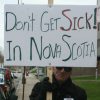
KJIPUKTUK (Halifax) – SInce at least late February migrant justice advocates and health experts have been asking the province to implement specific measures ensure that migrants, including people without migration status, refugee claimants, international students and migrant workers, all have full access to the COVID-19 vaccine.
Getting the province to pay attention continues to be an uphill battle.
A virtual press conference held this morning reminded the people in charge one again that language barriers, not having a health card, an over-dependence on employers, as well as concerns about confidentiality present serious obstacles for many.
“We are calling for immediate action on the part of the Nova Scotia government to ensure a safe, accessible and just vaccine plan, which does not leave migrants behind,” said Stacey Gomez, an organizer with No One is Illegal – Halifax/Kjipuktuk (NOII-Hfx) and the Migrant Worker Rights Working Group.
“For example, while Nova Scotians are able to book their vaccine appointments online, migrants without health cards are required to call a number to book an appointment. They face many barriers in doing so, including not being able to get through sometimes because of the long wait times. It’s also difficult to navigate the system when you call in, Gomez said.
Migrant workers enrolled in the temporary foreign worker program are particularly vulnerable to coercion by their employers, making it difficult to come to their own independent decision in terms of the vaccine, Gomez said.
Refugees equally affected
The inability to book an online appointment without a Nova Scotia health card is something that affects refugees as well, said Shiva Nourpanah, Halifax Refugee Clinic Board Member and Adjunct Prof, Dalhousie and Saint Mary’s University.
“Refugee claimants do have government health care provided by the federal government, but they’re still not able to access vaccination appointments in the smooth facilitated way that is available to Nova Scotians living in Nova Scotia, who have MSI cards, Nourpanah said.
See also: Too many barriers to vaccine access for migrants, open letter states
No sharing of confidential data
In a taped message Tari Ajadi, a board member of the Health Association of African Canadians as well as with the East Coast Prison Justice Society addressed the need for privacy, given the precarious status of many migrants.
“Provincial leaders must ensure that all migrants, regardless of immigration status, have access to vaccines in a safe, just way. This includes a formal guarantee that information will not be shared with the Canada Border Services Agency, and ensuring that vaccines are available in the newcomer clinic as well as in mobile vaccination clinics,” Ajadi said.
“By forcing people to disclose information and setting up barriers if they do not have a health card, we run the risk of undermining trust in the health system at a time when we need to encourage everyone to get vaccinated. We also run the risk of exposing migrant residents regardless of immigration status to harmful stress, which may have further health implications in the future, said Ajadi.
Highest risk
Monika Dutt, MD, a public health and family physician at the Ally Centre of Cape Breton provided her own unique healthcare perspective.
“As a health care worker and community member, I was profoundly grateful to receive my first dose of vaccine and I want every resident of the province to feel the same ease and safety when getting there,” said Dutt.
“As a family physician, I speak to many people who face barriers to obtaining a vaccine, whether through lack of documentation, transportation, literacy, and other factors. All of this happens in the broader context of knowing that those who are migrant workers or who have precarious immigration status are amongst the highest risk of both acquiring COVID-19 infection as well as suffering poor health outcomes from the infection.”
“We need to do all we can to ensure anyone who wants a vaccine can get one. Extra steps need to be taken to ensure access that is supportive and safe for all. Whether that means ensuring translation, explicitly stating that border enforcement or police will not be contacted by healthcare staff, or providing vaccines in convenient locations and convenient times,” she said.
Province not really listening
Unfortunately, despite some minor improvements over time, the province has mostly been ignoring the increasingly urgent requests from advocates, Gomez said.
Prioritization of migrant workers vaccination, that the province and Dr. Strang at one time announced, never materialized, Gomez said.
As well, advocates sent a letter more than two months ago calling for improved vaccine access for all migrants. A response was only received about a week ago, and that response didn’t address many of the concerns nor did it provide any commitment to actually improve the situation, said Gomez.
Shiva Nourpanah early in the press conference emphasized how being inclusionary in terms of vaccination is more than the pursuit of a special interest, no matter how valid that is on its own.
“If there’s one lesson we’ve learned from the pandemic it is that this is the moment to put in place policies which will ensure that everybody is included. It’s a cliche to say it at this point, but the virus really does affect us all,” she said.
Call to action
The group is pushing a series of concrete demands that will go far in addressing its concerns and making the vaccination process more inclusionary.
On June 7th, No One Is Illegal -Kjipuktuk Halifax released a campaign video which featured community members voicing their support for improved vaccine access for migrants.
Some of the proposed measures the group is pushing for include:
- Accessible vaccine sites, including mobile clinics for migrant workers
- Designating the Newcomer Health Clinic in Halifax as a vaccine site open to all migrant workers
- A guarantee that there will be no sharing of personal information with immigration officials
- Time off without loss of pay for vaccine appointments
- Accessible vaccine booking for all by opening the online booking system to people without NS health cards
- Commitment to ensure that migrant workers who want the vaccine can access two doses before returning to their country of origin
- Protection from employer coercion amd reprisals for those who decide not to get the vaccine
- Educational information that is culturally relevant
You can reach the Minister of Health and Wellness via email Health.Minister@novascotia.ca or phone: 902-424-5818
See also: COVID-19’s impact on migrant workers adds urgency to calls for permanent status
Check out our new community calendar!
With a special thanks to our generous donors who make publication of the Nova Scotia Advocate possible.
Subscribe to the Nova Scotia Advocate weekly digest and never miss an article again. It’s free!



